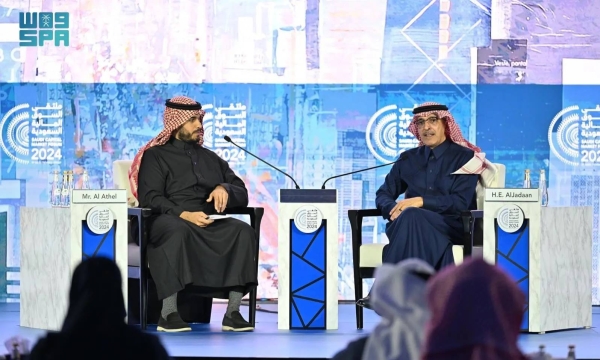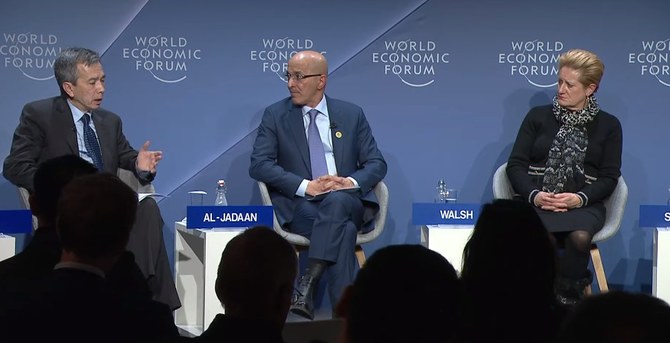
Minister of Finance Mohammed Al-Jadaan said that Saudi Arabia’s non-oil gross domestic product (GDP) is recording a growth of over four percent and is expected to exceed five percent in the medium term.
Attending a panel session at the 3rd Saudi Capital Market Forum in Riyadh on Monday, Al-Jadaan said that the non-oil GDP witnessed healthy growth despite the crises. “This growth confirms the strength and resilience of the Saudi economy.”
The minister said that Saudi Arabia promised a major transformation since the launch of the Kingdom’s Vision 2030. “This transformation began to show success and commitment during good and difficult times,” he said while stressing the Kingdom’s commitment to bringing stability and investment opportunities to the world.
“This is a very young country that promised transformation seven years ago, and now it is showing that and is already demonstrating it in this hall. Showing success as well as the ability to implement and commit during good and difficult times,” he said, adding: “we will continue this approach, and we will continue until 2030 and beyond 2030. We will continue a journey that we want to share with the world,” he said.
Al-Jadaan emphasized that Saudi Arabia wants to contribute to achieving stability in the world, and provide business opportunities for the world. “We are committed and are very serious about this matter, and on the geopolitical side we affirm our commitment to deal with the current situations. Saudi Arabia has shown very clearly its commitment to peace and stability, and we will continue to press to achieve this by working with “our friends and allies, and with regard to the financial sector, we are committed.”
Al-Jadaan disclosed that Saudi Arabia has a program to develop the financial sector, which in fact brings together a very sensitive group of participants. “There are two independent regulatory bodies that we do not need to tell them what they should do. There is also a third regulatory body that joins us along with the Ministry of Finance, Ministry of Investment, and Ministry of Economy. These ministries provide the three regulatory bodies with the pulse of what should be done and what the economy needs and what investors need so as to ensure that there is coordination and that there is consensus,” he said while emphasizing that this is a very strong position.
The minister stressed that this coordinated approach to the financial sector is a very good advantage and investors should be happy with it. It is noteworthy that Saudi Arabia, the largest oil exporting country in the world, is accelerating its plans to diversify the economy away from oil within the framework of its Vision 2030.
The Kingdom aims to develop sectors such as tourism and industry, expand the private sector, and provide job opportunities. Non-oil businesses significantly outperformed oil sector expansion last year, fueling overall growth that had slowed on the back of oil production cuts and lower prices. Non-oil GDP recorded a growth of 4.6 percent in 2023, while GDP as a whole contracted 0.9 percent. The government expects an increase in spending over the coming years, which analysts said will give a boost to domestic growth and support non-oil GDP, but will also cause a financial deficit in the Kingdom of about two percent this year.
Al-Jadaan said that Saudi Arabia"s economic and social reforms have allowed it to be better prepared to deal with external shocks such as the COVIDd-19 pandemic and geopolitical risks. The minister pointed to the transformation in social and economic aspects as well as in financial policy. He also highlighted the success in reducing the budget deficit from 15 percent to two percent or less. He said that this is the way to make the Kingdom more powerful and capable of dealing with these shocks.
The Saudi budget recorded total revenues of about SR1.21 trillion in 2023, compared to total expenditures of about SR1.29 trillion, bringing the deficit to about SR81 billion. Data from the Ministry of Finance revealed that the actual budget revenues in the fourth quarter of 2023 amounted to SR357.984 billion, while the value of budget expenditures in the fourth quarter of 2023 amounted to about SR394.979 billion, according to what the ministry announced on February 14, this year.
The value of actual non-oil revenues in 2023 amounted to about SR457.728 billion, an annual increase of 11 percent, while non-oil revenues in the fourth quarter of 2023 amounted to about SR108.773 billion. Actual oil revenues amounted to about SR754.6 billion in 2023, while oil revenues increased 28 percent on an annual basis to SR249.2 billion in the last quarter of 2023.
However, non-oil revenues decreased by 12 percent to SR108.8 billion in the last quarter of 2023, compared to approximately SR123.8 billion in the same quarter of 2022. Total oil revenues amounted to SR505.35 billion in the first nine months of 2023, compared to about SR663.08 billion in the same period of the previous year. Total non-oil revenues increased by 22 percent to about SR348.9 billion in the nine months of 2023, compared to SR287 billion in the comparative period of 2022.












